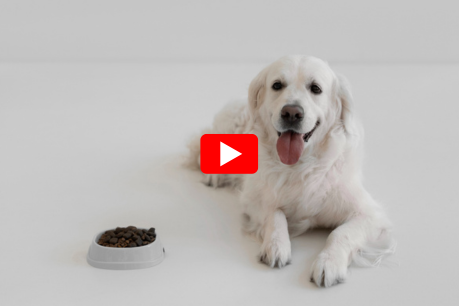Psyllium Husk for Dogs with Allergies: Full Guide & Tips
Allergies in dogs are one of the most common yet often misunderstood health issues faced by pet owners. From itchy skin and red, inflamed ears to chronic digestive troubles, allergic reactions can manifest in several frustrating ways.
As natural, holistic approaches to pet care gain popularity, many owners are exploring dietary fibers like psyllium husk as potential aids for their dogs’ well-being — including those with allergies.
Psyllium husk can support dogs with allergies by promoting gut health, easing digestion, and helping reduce inflammation-related skin issues.
In this comprehensive guide, we’ll dive deep into the role of psyllium husk for dogs with allergies, its benefits, how it interacts with the digestive and immune systems, safe usage tips, potential side effects, and everything else you need to know to decide whether it’s the right addition to your dog’s care routine.
What Are Allergies in Dogs?
Allergies in dogs are abnormal immune responses to otherwise harmless substances. When a dog’s immune system encounters allergens like pollen, dust, certain foods, or chemicals, it triggers the release of histamines and other chemicals.
These cause inflammation and symptoms such as itching, swelling, digestive upsets, and respiratory discomfort.
Some dogs experience seasonal allergies, while others react to particular foods or flea bites. Understanding the root of a dog’s allergies is crucial in managing their symptoms effectively.
Integrating supportive dietary adjustments like adding psyllium husk may help ease some allergic reactions, especially those affecting the digestive tract and skin.
Types of Allergies in Dogs
There are several types of allergies that commonly affect dogs:
Environmental Allergies (Atopy): Caused by airborne allergens like pollen, mold, and dust. Symptoms typically appear seasonally and involve itching, sneezing, and watery eyes.
Food Allergies: Triggered by specific proteins or ingredients such as beef, dairy, wheat, or soy. These allergies often lead to chronic digestive problems and skin irritations.
Flea Allergy Dermatitis (FAD): Caused by an allergic reaction to flea saliva. Even one bite can result in intense itching and skin inflammation.
Contact Allergies: Occur when a dog’s skin reacts to direct contact with certain materials like synthetic fibers, detergents, or grooming products.
Each allergy type presents differently and may require a combination of dietary changes, medications, and natural remedies for effective management.
What is Psyllium Husk?
Psyllium husk is a natural, plant-based fiber obtained from the outer shell of seeds from the Plantago ovata plant, native to India and the Mediterranean region.
It has been used for centuries in traditional medicine to support digestion, relieve constipation, and manage cholesterol levels in humans.
In recent years, its use has extended to veterinary care, particularly in managing canine constipation and diarrhea. Psyllium husk forms a gel-like substance in the digestive tract when mixed with water, aiding in stool formation and gut health.
Pet owners and veterinarians have begun exploring its secondary benefits in supporting dogs with allergies, especially those suffering from related gastrointestinal issues.
How Can Psyllium Husk Help Dogs with Allergies?
While psyllium husk does not directly treat allergies, it indirectly benefits allergy-prone dogs by supporting digestive health and immune balance. Here’s how:
Supports Gut Health and Microbiome Balance
A large portion of a dog’s immune system — approximately 70% — resides in the gut. Maintaining a healthy intestinal environment helps regulate immune responses and potentially reduces the body’s tendency to overreact to allergens.
Psyllium husk functions as a prebiotic, feeding beneficial gut bacteria and promoting a balanced microbiome.
A healthy gut can mitigate systemic inflammation and indirectly ease allergy symptoms, especially skin conditions triggered by immune hypersensitivity.
Helps Manage Food Allergy Symptoms
Dogs with food allergies frequently experience digestive issues such as loose stools, vomiting, diarrhea, or excessive gas. Psyllium husk can be particularly helpful in managing these problems because it regulates bowel movements and improves stool consistency.
When dogs undergo elimination diets or hypoallergenic food trials to identify triggers, psyllium husk can ease the digestive transition. Its stool-bulking effect provides relief from both diarrhea and constipation, making it a versatile tool in food allergy management.
May Reduce Inflammatory Skin Reactions
Many allergic reactions in dogs manifest through the skin, causing chronic itchiness, rashes, or inflamed paws. While psyllium husk doesn’t work directly on the skin, it may indirectly reduce inflammation by promoting gut health and immune balance.
Some studies suggest that improving intestinal health helps regulate immune responses throughout the body, including the skin. Anecdotal reports from pet owners indicate that allergy-prone dogs showed improvement in skin irritation after incorporating psyllium husk into their diet.
Eases Secondary Digestive Issues from Allergy Medications
Allergy treatments such as steroids, antihistamines, or antibiotics often come with gastrointestinal side effects, including constipation, diarrhea, or bloating.
Psyllium husk’s hydrating and stool-normalizing properties can ease these symptoms, promoting regular and comfortable digestion while your dog undergoes allergy treatment.
This makes psyllium husk a supportive addition to comprehensive allergy care routines, reducing the gastrointestinal stress associated with both allergies and their treatments.
Recommended Dosage of Psyllium Husk for Dogs
Using psyllium husk safely requires appropriate dosing based on your dog’s weight and health status. General guidelines include:
-
Small Dogs (under 20 lbs): ¼ to ½ teaspoon daily
-
Medium Dogs (20–50 lbs): ½ to 1 teaspoon daily
-
Large Dogs (over 50 lbs): 1 to 2 teaspoons daily
Always start with the lowest dose and increase gradually while monitoring your dog’s stool consistency and allergy symptoms. It’s important to discuss new additions to your dog’s diet with a veterinarian, especially if your pet has chronic health conditions.
How to Feed Psyllium Husk to Dogs
Psyllium husk can be easily added to a dog’s food. Since it forms a gel-like consistency when mixed with liquids, it’s best combined with wet foods or softened kibble.
Methods of Serving:
-
Stir into canned food or homemade dog meals.
-
Mix with plain, unsweetened yogurt (unless your dog is lactose intolerant).
-
Combine with low-sodium chicken or bone broth for a hydrating treat.
Ensure your dog always has access to fresh, clean water when consuming psyllium husk, as it absorbs significant liquid and could lead to dehydration or intestinal blockages without proper hydration.
Potential Side Effects of Psyllium Husk in Dogs
While psyllium husk is considered safe for dogs, excessive amounts or sudden introduction can cause side effects.
Possible Side Effects Include:
-
Gas and bloating
-
Loose stools or diarrhea (from overdose)
-
Constipation (if insufficient water intake)
-
Decreased appetite
If any adverse effects occur, discontinue use and consult your veterinarian immediately. Always introduce psyllium gradually to allow your dog’s digestive system to adjust.
When to Avoid Psyllium Husk for Dogs
Not all dogs are suitable candidates for psyllium husk supplementation. Avoid or use cautiously in dogs who:
-
Are severely dehydrated
-
Have a history of esophageal or intestinal blockages
-
Suffer from megacolon or chronic constipation without veterinary supervision
Always seek professional advice before introducing psyllium husk into your dog’s diet if your pet has pre-existing medical conditions.
Psyllium Husk vs. Other Fiber Sources for Allergic Dogs
Pet owners often compare psyllium husk with other fiber-rich foods like pumpkin, sweet potato, or oat bran. While these alternatives are nutritious and beneficial, psyllium husk stands out due to its high soluble fiber content and ability to form a gel-like bulk in the intestines.
This makes psyllium particularly effective for managing both diarrhea and constipation — a valuable benefit for dogs with allergies that cause fluctuating digestive issues.
Tips for Using Psyllium Husk for Allergic Dogs
To safely and effectively incorporate psyllium husk into your dog’s routine:
-
Start with a small amount and increase slowly.
-
Monitor your dog’s stool consistency daily.
-
Use only pure psyllium husk powder with no added flavors or sweeteners.
-
Provide plenty of water at all times.
-
Pair psyllium husk with a balanced, hypoallergenic diet when managing food allergies.
-
Consult your veterinarian before starting psyllium husk if your dog is on medication.
Conclusion
While psyllium husk is not a standalone cure for canine allergies, it can play an important supportive role by improving digestive health, easing allergy-related gastrointestinal symptoms, and potentially reducing inflammatory responses.
When combined with a balanced diet, environmental controls, and appropriate veterinary care, psyllium husk offers a gentle, natural way to enhance the overall well-being of dogs suffering from allergies.
References Link
.



